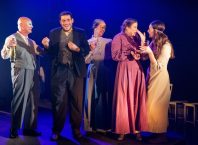Shukshin’s Short Stories, a production of the Russian State Theatre of Nations directed by Alvis Hermanis, is coming to the Cameri Theatre from January 18 – 24 for six performances. In a press meeting that took place this morning at the Cameri , Alla Donatovna Mikhaleva, Literary Director of the Theatre of Nations announced that the play has just been nominated for the Golden Mask, a prestigious theatre prize in Russia. Mikhaleva is currently visiting Israel as part of the IsraDrama Festival, organized by the Institute of Israeli Drama to present Israeli theatre to the international community.
The play was created from ten short stories written by Vasily Makarovich Shukshin (1929 – 1975), describing the lives of people in the village where he grew up, Srostki. It has enjoyed great success in Russia, says Mikhaleva, noting that “it is rare that both critics and audiences love a play.” Noam Semel, Director of the Cameri, joined in praising the play, noting that this is the first time that the Cameri has decided to host a play for such an extended run in its largest hall, Cameri 1.
Israeli director Omri Nitzan saw the play performed in Russian in Moscow, armed with only a basic translation and short synopsis, yet says “I don’t remember the last time I enjoyed myself so much at the theatre. It is a return to the foundations of theatre – storytelling. Even without understanding Russian, the performance that takes place onstage compensates for the language barrier.”

Thanks to IsraDrama, Russian theatre critic and radio journalist Marina Timasheva was on hand to provide additional background on the author and play:
Vasily Makarovich Shukshin was born in the village of Srostki in Altai Krai. An outstanding author, actor and director, he is best known for two of his films: Kalina Krasnaya (1973, English title: The Red Snowball Tree) and They Fought for their Motherland (1975, based on the novel by Mikhail Sholokhov). His art and stories have made him a symbol of the Russian man and spirit. It is strange that someone who symbolizes Russia was not welcomed by the Russian stage and was not often seen there. They say that a man is not a prophet in his own town. We had to bring a young director from Latvia who rediscovered Shukshin. A foreign young man, a European, capable of seeing Shukshin in a completely different light.
In Russia theatre was psychological, emotional, and strong. There is a phrase we use: “tearing their shirts.” You saw the set – a long bench and large portraits. These are portraits of people from the village [photographs taken by Monica Pormale at Srostki], but they have been created to resemble photos in a glossy magazine. The set creates distance between the actors and the action on the stage, preventing them from creating a naturalistic performance. It offers the actors a style of acting that is not common in Russia, in which you are not the same as your character.
Before working on the play, the entire theatre ensemble travelled to the small village of Srostki where they met several elderly people who had been Shukshin’s inspiration for characters in the stories. They do fantastic things. There are ten stories, with 100 characters – all played by 8 actors. The actors leave the stage for only a moment between stories, yet return completely changed. Without any special makeup, a wasted old lady is transformed into a sexy beauty. Perhaps there is no emotional truth but there is a power, a clarity, an emotional glow. Even though the style of acting is different, the essence remains unaltered. The stories tell of the average man who wants a better life, but does not know how to achieve it.
The larger than life photos [used in the set as a backdrop] emphasize the play’s theme as expressed in this quote from Chekov: “What a beautiful life could have been lived beside these trees.” The stories are told separately, they are not merged or arranged as a collage, yet they form a single entity. Not to scare the Jews, it is a very Russian story, yet it is also a universal human story. There is a story of a poor man who spends his last penny on an amazing pair of boots, beautiful white boots with a high heel. No one in the village can have any use of such boots because the village is full of mud that comes up to the waist. Doesn’t that remind you of Sholem Aleichem? It’s the same: sad, funny, human.
Noam Semel concluded the press meeting most suitably with a story: “A man approached James Joyce asking where in the world he should travel in order to become a writer. Joyce responded: You came here on a train from a village in Ireland. Get back on the train and go back to the village. The whole world is there in the village. That is how we felt about this play. It touched our hearts.”
Midnight East readers who would like to feel that they have the inside scoop on the play – Mikhaleva has been bombarded with emails asking whether Russian actress Chulpan Khamatova, who has been highly praised for her performance in the play, will come to Israel. This morning at the Cameri, Mikhaleva said: Yes.
Performances:
Shukshin’s Short Stories
January 18, 19, 21, 22, 23, 24 at 20:00
Duration: 3 hours and 40 minutes with two intermissions
The play will be performed in Russian with Hebrew superscripts
The Cameri Theater, 19 Shaul Hamelech Street, Tel Aviv
Tickets: 03-6060960, www.cameri.co.il






Comments are closed.